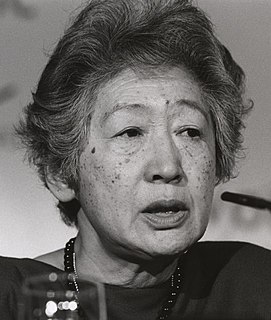A Quote by Amartya Sen
Japan became an imperialist country in many ways, but that was much later, after it had already made big progress. I don?t think Japan?s wealth was based on exploiting China. Japan?s wealth was based on its expansion in international trade.
Related Quotes
Japan used to beat China routinely in wars. You know that, right? Japan used to beat China, they routinely beat China. Why are we defending? You know the pact we have with Japan is interesting. Because if somebody attacks us, Japan does not have to help.If somebody attacks Japan, we have to help Japan.
Revolutionary war is an antitoxin that not only eliminates the enemy's poison but also purges us of our own filth. Every just, revolutionary war is endowed with tremendous power and can transform many things or clear the way for their transformation. The Sino-Japanese war will transform both China and Japan; provided China perseveres in the War of Resistance and in the united front, the old Japan will surely be transformed into a new Japan and the old China into a new China, and people and everything else in both China and Japan will be transformed during and after the war.
I really love Japan, and I liked living there very much, and there are so many terrific things about Japan. However, I do think what's amazing is that Japan really prides itself on being monoracial. It doesn't have the same kind of idea as in the U.K. or Canada or the United States, in which the idea of diversity is a strength.
Japan's diplomatic efforts could have had a broader international perspective. Relations with the U.S. are, of course, the cornerstone of Japan's diplomacy, but the U.S. acts on its global strategy. For instance, Washington suddenly got closer to China in the early 1970s as part of its strategy against the Soviet Union.
I have concluded that most PhD economists under appraise the power of the common-stock-based "wealth effect," under current extreme conditions... "Wealth effects" involve mathematical puzzles that are not nearly so well worked out as physics theories and never can be... What has happened in Japan over roughly the last ten years has shaken up academic economics, as it obviously should, creating strong worries about recession from "wealth effects" in reverse.







































